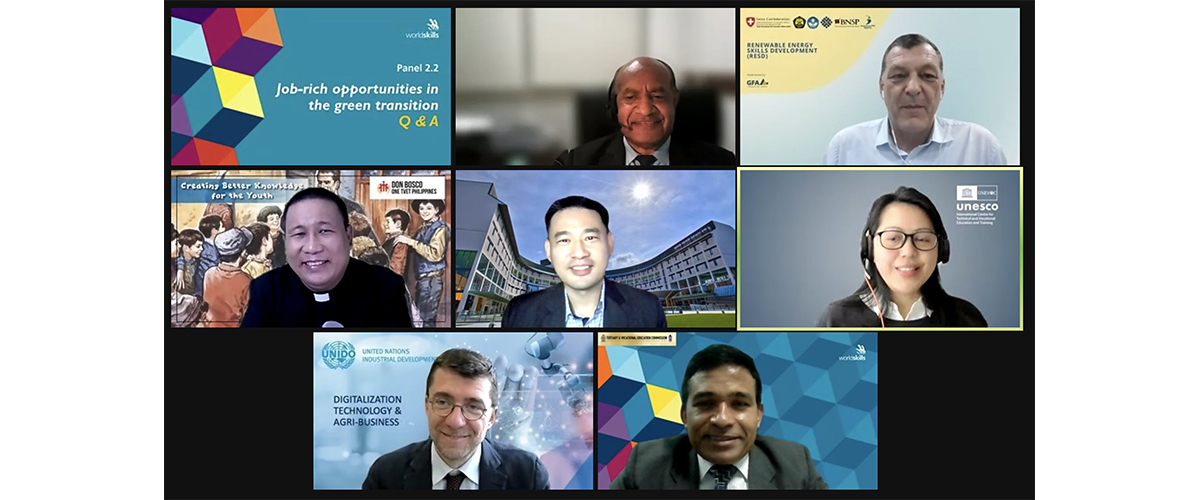
The UNESCO-UNEVOC International Centre: Who We Are | What We Do | Working With Us | Get in Touch
The UNEVOC Network: Learn About the Network | UNEVOC Network Directory
For Members: UNEVOC Centre Dashboard
Thematic Areas: Inclusion and Youth | Digital Transformation | Private Sector Engagement | SDGs and Greening TVET
Our Key Programmes & Projects: BILT: Bridging Innovation and Learning in TVET | Building TVET resilience | TVET Leadership Programme | WYSD: World Youth Skills Day
Past Activities: COVID-19 response | i-hubs project | TVET Global Forums | Virtual Conferences | YEM Knowledge Portal
Our Services & Resources: Publications | TVET Forum | TVET Country Profiles | TVETipedia Glossary | Innovative and Promising Practices | Toolkits for TVET Providers | Entrepreneurial Learning Guide
Events: Major TVET Events | UNEVOC Network News

26 October 2021
UNESCO-UNEVOC and UNIDO![]() co-organized a session on “Job-rich opportunities of the green transition” at the WorldSkills Conference 2021. While the session showcased a range of cooperation mechanisms with industry, social partners and communities, it also revealed that a shortage of highly-skilled, professional-level engineers and technicians, who possess industry-based competencies, can impact the introduction of green technologies and the overall uptake of companies introducing green jobs.
co-organized a session on “Job-rich opportunities of the green transition” at the WorldSkills Conference 2021. While the session showcased a range of cooperation mechanisms with industry, social partners and communities, it also revealed that a shortage of highly-skilled, professional-level engineers and technicians, who possess industry-based competencies, can impact the introduction of green technologies and the overall uptake of companies introducing green jobs.
UNIDO’s work focuses on implementing a resource efficient and cleaner production model as well as a holistic approach to the creation of eco-industrial zones. A joint UNIDO project with the Chinese company Midea makes it possible to implement this model in the production of environmentally-friendly and efficient cooling system products. Riccardo Saviglioni, Chief, Agro-Industries and Skills Development Division, UNIDO, emphasized the need for school systems to follow the changes caused by mega trends in the business space and to capture the developments occurring in present and future technologies.
The conference session, which was co-moderated by Kenneth Barrientos, Programme Officer, UNESCO-UNEVOC, and Robert Parua, Education Specialist, UNESCO Beijing Cluster Office, featured several examples of technical and vocational education and training (TVET) providers engaging with business and industry to supply a workforce with green competencies. Janaka Jayalath, Deputy Director General, TVEC, Sri Lanka, shared an initiative focused on seizing the job-rich potential in green growth sectors by fostering a three-pronged approach of greening TVET policy, labour market information forecasting and improved planning of TVET to meet the needs of the energy and construction sectors.
Adrian Ang, Senior Manager of the Integrative Built Environment Centre at Temasek Polytechnic, Singapore, highlighted industry regulatory training co-developed with the National Environment Agency. The programme seizes the potential of the green transition by adhering to the three I’s approach of identifying, integrating and implementing new qualifications and competencies in TVET, as proposed by UNESCO-UNEVOC’s BILT project. The training equips technicians with in-demand skills, along with up-to-date knowledge to manage harmful compounds used in many industrial sub-sectors.
Martin Stottle, Team Leader of the Renewable Energy Skills Development Project, SECO/GFA Group, Indonesia, promoted a project approach that includes scanning labour market demands, co-developing curricula with companies, and supporting five Indonesian polytechnics and five training providers of non-formal VET in the preparation of a skilled workforce to support renewable energy power plants in the country. The project builds on existing processes and structures, but with relevant input from industries and better outcomes for TVET institutions that seek to upgrade their current programme qualifications.
Brian Butanas, Technical Director of the Don Bosco TVET Centre, Philippines, shared the institution’s mission and value-based approach to training young people. Courses are centred around the development of multiple foundation competencies with additional training on green competence areas to mitigate the employment impact and training costs stemming from the pandemic.
All of the projects presented at the WorldSkills session employ the much-needed linkages and partnership mechanisms with stakeholders from government ministries, training providers and business and industry sectors to support achieving the SDGs and the green transition through energy and other sub-sectors.